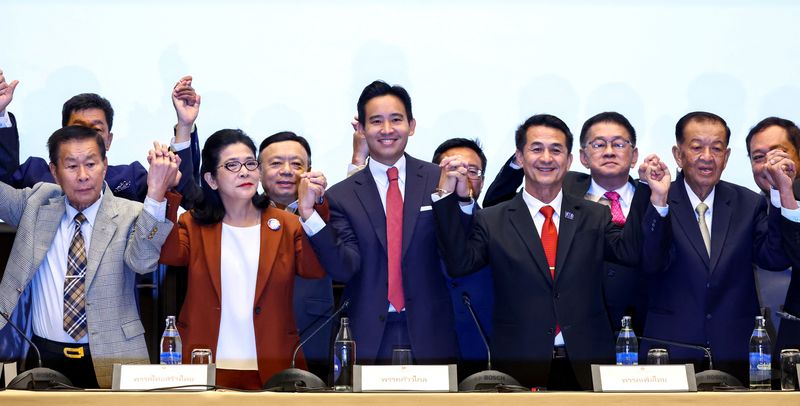By Panarat Thepgumpanat and Chayut Setboonsarng
BANGKOK (Reuters) - Thailand's progressive Move Forward party on Friday said potential coalition partners need not support its controversial stance on amending the royal insult law, as it seeks to win the backing of other parties to form a government.
Move Forward, led by Pita Limjaroenrat, won the most seats in the lower house in this week's election, riding on a wave of youth support for policies like undoing business monopolies and amending the strict lese-majeste law, known as article 112 of the criminal code.
"If parties agree with us on 112, then we are ready to include it in the agreement, but it is not a condition for joining the government," senior Move Forward party member Sirikanya Tansakun said on a morning talk show, adding that the party would table the amendment in parliament independently.
A coalition agreement is expected to be announced on Monday.
The lese-majeste law prescribes up to 15 years of jail for perceived offences against the monarchy, which many Thais consider sacrosanct. But opponents say it is used to stifle dissent as some 200 people have been charged in recent years under the law.
Move Forward wants to amend the law to reduce prison terms and narrow down complainants to just the Royal Household Bureau.
Move Forward's eight-party coalition talks have mustered 313 votes in 750-seat bicameral legislature, but under the military-drafted constitution, it will need support from either the unelected conservative-leaning senate or other parties to form a government.
Third-place winner Bhumjaithai party, which commands a critical voting bloc, said it would not support any premier that would amend the lese-majeste law.
Analysts say not forcing other parties to adopt its position on lese-majeste could help Move Forward draw in additional votes.
"They've decelerated significantly on this issue, which eases the pressure on government parties from supporting the coalition," political scientist Wanwichit Boonprong of Rangsit University said.
Another divisive topic was the use of cannabis, which was legalised last year without accompanying regulations in place, leading to a surge in recreational use that angered conservatives.

Move Forward said it would re-criminalise the substance before deploying a legal framework allowing for medical and regulated recreational use.
"We support medical marijuana, and recreational use must be regulated," a recently elected parliamentarian for Move Forward, Parit Wacharasindhu, said.